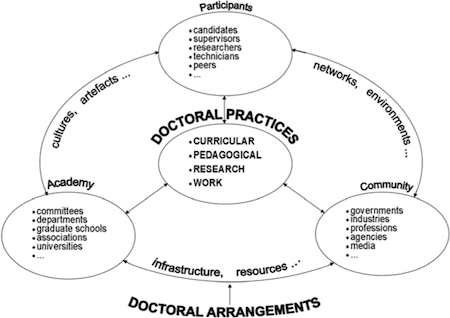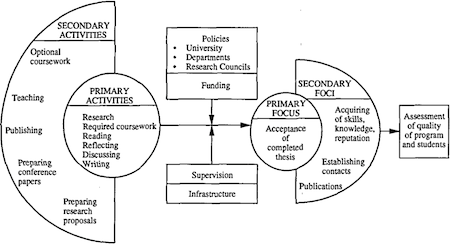Conceptualising Doctoral Practices
My thesis is examining how PhD students’ academic practices are facilitated by the adoption and use of social media. In attempting to develop a conceptual model of doctoral practices, it has been useful to look at similar examples in the literature.
From the outset, I have adopted a holistic perspective of what constitutes doctoral study, looking beyond those activities that only support thesis-development. I’ve therefore been particularly impressed with some of Jim Cumming’s writing. His integrative model (2010) incorporates four mutually inclusive doctoral practices that describe curricular, pedagogical, research and work-based activities. These are, he suggests, in a constant state of flux, and embedded within a diverse range of relations, networks and cultures that orient around several key doctoral ‘arrangements,’ which he defines as participants, the academy, and the community.
Integrative model of doctoral enterprise (Cumming, 2010; 31)
Cumming (2010) also highlights a number of previous conceptual models. Though slightly dated, Holdaway’s (1996) framework of activities and foci is the most comprehensive.
A conceptual framework of activities and foci of graduate education (Holdaway, 1996; 52)
His distinction between ‘primary’ and ‘secondary’ foci relates closely with a coding model proposed by McAlpine et al. (2009), in which activities are designated ‘doctoral-specific’ or ‘academic-general.’ These are mapped across 3 levels (formal, semi-formal and informal) to form a matrix of six activity clusters. This categorisation of formality seem somewhat arbitrary to me. And what do we mean by formal anyway? Is it an indicator of importance, or is it something that is scheduled, rather than spontaneous? Does formality distinguish whether an activity is optional or mandatory, or whether it has some assessment criteria? I’ve discussed the problem of ‘formality’ in doctoral education in a previous post. Even if some agreed definition is established, I think the formality of individual activities should be thought of as being highly contested (by the PhD student, supervisor(s), Faculty etc.), and as such, constitute potential sources of tension.
The conceptual model I am developing from my empirical work is no more than a useful heuristic with which to guide my analysis, which – as I’m using an activity theory-based approach – is essentially to inform the various components of the activity systems I am developing.
As such, general academic activities are of limited use. But dig deeper, and they each encompass a wide range of academic and social processes. Take conferences, for example, and you’re looking at information sourcing (call for papers), writing (proposals, abstracts, papers), disseminating (presenting), making contacts (networking), giving and receiving critical feedback, gaining recognition in the research field etc. Each of these processes (along with many others) permeates the various interrelated activities that each of my participants are engaged in. Throw social media (the focus of my research) into the mix, and you can start to build a picture of where and how they are influential, disruptive and transformative.
Multiple occurrences of these activities coalesce into a highly complex analytical framework (for each participant), but this ensures that a qualitative analysis of each of their social media experiences is highly situated and contextualised within the various practices and stages of their doctoral studies.
References
Cumming, J. (2010). Doctoral enterprise: A holistic conception of evolving practices and arrangements. Studies in Higher Education, 35(1), 25-39.
Holdaway, E. A. (1996). Current issues in graduate education. Journal of Higher Education Policy and Management, 18(1), 59–74.
McAlpine, L., Jazvac-Martek, M., & Hopwood, N. (2009). Doctoral student experience: Activities and difficulties influencing identity development. International Journal for Researcher Development, 1(1). 97-109.
Tags: doctoral education, phd




April 13th, 2011 at 4:27 am
This is so helpful. Thanks for sharing.
April 13th, 2011 at 2:19 pm
As I read this, I think you are really talking about agency and where is the agency in an action. “Formal” could be reinterpreted as agency coming from the “university or program” level. It could also come from the committee level, depending on the individual’s perception of what is required. I think you are right in redefining the categories of “learning”. But I also think you need to look at the perceived agency for actions and “ownership of the learning” for doctoral students.
April 14th, 2011 at 4:43 am
thought you’d be interested in the fledgling Wikiversity page for PhD. Also, the notes I keep for an open and networked approach to doing a PhD
April 14th, 2011 at 7:00 pm
Thanks Leigh. I’m aware of your Open PhD and I’m following it with interest.
Virginia, from an activity theory perspective, agency is demonstrated by the actors’ abilities to engage in object-directed activities that are mediated by the tools they use. Identifying these often multiple and interrelated activity systems is (I think) a complex and difficult procedure. Which is why it’s important for me to to try and develop a recursive process between stages of observation, analyses of digital artefacts and participant interviews, as I draft and redraft the activity systems.
The way I see it, objects (or broadly, the ‘problem spaces’ at which the activity systems are oriented) are partly shared, fragmented, and contested (by the different actors, including Faculty etc.), creating systemic contradictions. These become manifest as tensions in the individual activity systems, and can be seen as potential sources of learning and development.
I’m not too sure what you mean by perceived agency, in this context anyway. Perhaps you could enlarge on this.
April 14th, 2011 at 11:14 pm
I think there is a difference between the various “perceived” agencies from the point of view of the school, the students, and even the faculty, and the observation you may make as to “actual” agency. In other words, each party my perceive that either they or the others have agency in their learning, when in fact, it is the schools (with dissertation requirements) or professions (with licensing or hiring requirements) or stakeholders (with funding requirements) or etc…. who are directing the learning and the final dissertation product. An individual may feel, partway through the process, that what they are learning is not really what they want to learn, but they must because those at another level have taken away their agency in the process. There might be a parallel learning process going on: one for the individual and one for those who are perceived as holding legitimate power or agency.
June 10th, 2011 at 11:50 am
[…] concerns over the ambiguity of social media audiences, particularly around blogging. As I have discussed previously, doctoral practices can require negotiating a number of different contexts, which, even within my […]
September 19th, 2011 at 4:41 am
I am interested to hear how the doctoral students experiences are contextualized in terms of the use of social media in pursuit of their doctoral degrees. Thanks,
November 14th, 2011 at 2:01 pm
[…] Holistic models of doctoral practices provide more authentic representations of what doing a PhD actually entails, and the complex socio-educational structures that underpin it – what Cumming (2010) refers to as ‘doctoral enterprise’. Such approaches incorporate activities, forms of intellectual enquiry and social interaction beyond those parameters defining thesis-development, to those that are more attributable to exploring the general research field, and engaging in multiple practice contexts. […]